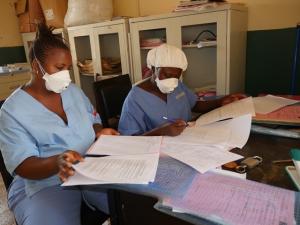Partners rally to end tuberculosis in Sierra Leone
FREETOWN, 24 March 2017 - On World Tuberculosis (TB) Day, the Government of Sierra Leone together with the World Health Organization and CISMAT called for united action to end TB in Sierra Leone, which is one of 30 countries globally with a severe burden of the disease.
Each year it is estimated that 20,000 Sierra Leoneans fall sick with TB, including over 2,500 children, with the equivalent of four TB-related deaths each day. Currently there are still many cases which are not diagnosed. This contributes to continuous transmission of the disease and increases the risk of complications for those affected.
“Thousands of lives are lost to tuberculosis in Salone, despite the fact it is preventable and curable,” said Dr Abu Bakarr Fofanah, Minister of Health and Sanitation. “This is unacceptable and it is tragic. We must work together in our communities to encourage people to come forward for tests and treatment and fight stigma against those affected, which is one of the major barriers that stop people from seeking care,” he added.
“The impact of TB is devastating, and yet we hear all too little about this silent killer,” said Dr. Alexander Chimbaru, Acting Country Representative for WHO in Sierra Leone. “Today we say this needs to change! Make today the day you stand up, speak out, and take action. If everyone plays their part, we can end tuberculosis in our lifetime.”
Abdulai A. Sesay from the Civil Society Movement Against Tuberculosis in Sierra Leone (CISMAT) urged TB Survivors to speak out and take an active role in TB control, saying that they could play a vital part in tackling myths and misperceptions about the disease. “We must also ensure that communities remain at the centre of the response. If we engage communities, we can curtail the spread of TB, challenge stigma and help protect the rights of patients and their families,” he added.
Dr. Chimbaru, the WHO Representative noted significant progress in expanding access to care and treatment for people with TB and commended the Ministry of Health and Sanitation and partners for furthering these efforts in line with the Sustainable Development Goals, which commit to ending the global TB epidemic by 2030.
• In 2016, 2,000 more cases were diagnosed and put on treatment compared to 2015. Timely diagnosis is the first step towards treatment and cure for those affected, and for controlling the disease.
• 87 percent of those diagnosed with TB and who complete a full course of treatment will be cured.
• Innovative diagnostic tools and treatment are now in place to rapidly detect drug-resistant TB, which affects an estimated 420 people in the country each year.
To effectively beat TB in Sierra Leone, officials from the Ministry of Health and Sanitation, WHO, CISMAT and partners emphasized the need for more timely diagnosis for people with TB; an end to stigmatization of those affected; and support from families, communities and health workers for TB patients to complete a full course of medicines, so that they can effectively beat the disease.
Tuberculosis is an infectious disease caused by bacteria that most often affect the lungs. It is preventable and curable but it must be diagnosed and treated early. Signs and symptoms include a cough that lasts for more than two weeks. People with TB can also experience pain in the chest, weakness, weight loss, fever and night sweats. TB medicines are available free of charge in health facilities in Sierra Leone.
The Sustainable Development Goals include targets to reduce the number of TB deaths by 90 percent by 2030, with an 80 percent reduction in new cases. The theme for this year’s World TB Day is “Unite to End TB”, with a special focus on “leaving no one behind.”
Anti-TB efforts in Sierra Leone are led by the National TB Programme at the Ministry of Health and Sanitation and have been supported by WHO, the Global Fund, Partners in Health, USAID, CDC and other partners.
Note to editors
WHO defines the 30 highest TB burden countries as:
The 20 countries with the highest absolute burden of disease (estimated number of new TB cases per year): Bangladesh, Brazil, China, Democratic People’s Republic of Korea, Democratic Republic of Congo, Ethiopia, India, Indonesia, Kenya, Mozambique, Myanmar, Nigeria, Pakistan, Papua New Guinea, Philippines, Russian Federation, South Africa, Thailand, the United Republic of Tanzania, and Viet Nam.
The 10 countries with the highest incidence rates (estimated number of new TB cases /100 000), and at least 10 000 estimated new TB cases per year: Angola, Cambodia, Central African Republic, Congo, Lesotho, Liberia, Namibia, Sierra Leone, Zambia and Zimbabwe.
Contacts
At WHO: Laura Keenan, keenanl [at] who.int (keenanl[at]who[dot]int), +232 786 33952
At the Ministry of Health and Sanitation: Kadrie Koroma, kadriekoroma [at] yahoo.com (kadriekoroma[at]yahoo[dot]com), +232 7667 2962
At CISMAT: Abdulai Abubakarr Sesay, cismatsierraleonetb [at] gmail.com (cismatsierraleonetb[at]gmail[dot]com),+232 762 02849



